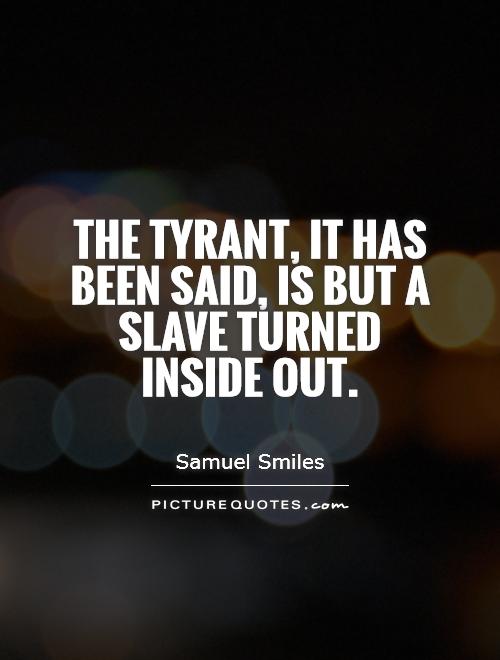The tyrant, it has been said, is but a slave turned inside out

The tyrant, it has been said, is but a slave turned inside out
In the context of Samuel Smiles, the quote "The tyrant, it has been said, is but a slave turned inside out" takes on a profound meaning that delves into the nature of power and its corrupting influence. Samuel Smiles, a Scottish author and reformer known for his writings on self-help and personal development, believed in the importance of individual responsibility and self-improvement. In his works, he often emphasized the virtues of hard work, perseverance, and moral integrity as the keys to success and happiness.When applied to the concept of tyranny, Smiles' quote suggests that those who wield power in a tyrannical manner are ultimately slaves to their own desires and insecurities. The tyrant, in his quest for control and domination, becomes a prisoner of his own fears and weaknesses. By oppressing others and seeking to impose his will upon them, the tyrant reveals his own inner turmoil and lack of true freedom.
In Smiles' view, true power comes from within – from a sense of self-mastery and moral strength. The tyrant, by contrast, is driven by a need to exert control over others in order to compensate for his own inner sense of inadequacy. In this sense, the tyrant is not truly powerful, but rather a slave to his own inner demons.
Moreover, Smiles believed that true greatness lies in the ability to uplift and empower others, rather than in the exercise of raw power. The tyrant, by contrast, seeks to diminish and subjugate those around him in order to bolster his own sense of superiority. In doing so, he reveals his own inner weakness and insecurity.












 Friendship Quotes
Friendship Quotes Love Quotes
Love Quotes Life Quotes
Life Quotes Funny Quotes
Funny Quotes Motivational Quotes
Motivational Quotes Inspirational Quotes
Inspirational Quotes